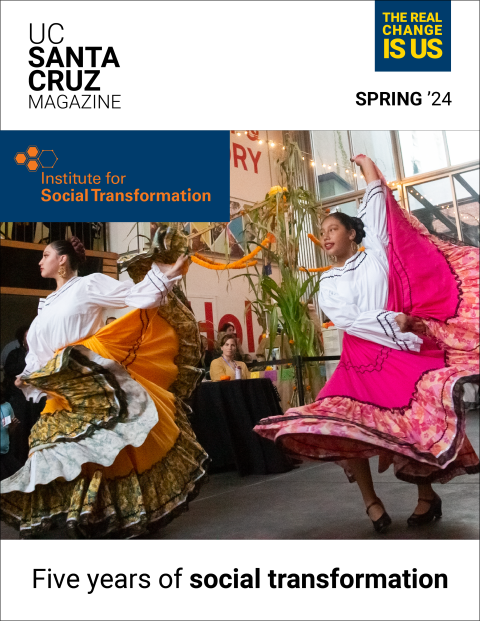We have seen so many successes these past years made possible by the hard work and extraordinary commitment of our faculty and staff. We have rebounded from the challenges we faced during COVID and the campus continues to be on the rise. We are committed to maintaining that trajectory and overcoming known and unknown challenges we will face along the way.
As you may know, Governor Gavin Newsom’s January state budget announcement for fiscal year 2025 highlighted continuing budget deficit projections. The governor’s announcement included deferrals of the 5% state funding increase negotiated in the Compact between the University of California and the governor, along with deferrals of various one-time funds. Within this overall context of uncertain financial conditions for the state budget, campus leadership has been involved in discussions to address a projected growing structural deficit in our core budget in a timely manner.
Structural deficits occur when the campus collectively, and for a variety of reasons, including unfunded mandates, spends more than the revenue received each year, over a number of years. For several years, we were able to cover those expenses with one-time funds and campus reserves, but that approach is not sustainable. While in the longer term, the financial picture for both the state budget and the campus budget will rebound, we must act deliberately now to begin closing the annual gap between revenue and expenses. We are actively pursuing ways to increase revenue; however, the reality is that much of the effort will need to be focused on reducing expenses. UC Santa Cruz is not alone in having to address such issues; most of the other UC campuses are facing similar challenges.
The 2023–24 budget (based on anticipated revenue) for UC Santa Cruz is just over $1 billion, of which approximately $530 million is in core funds. The projected annual budget gap for this fiscal year (FY24) is projected to be -$96 million and may grow to -$122 million in FY25 if we don’t take timely action. These projections will be regularly revised based on actual revenue and expenses, and a better understanding of unit spending plans, as the year progresses. To address these projected shortfalls, we are taking some steps to reduce expenses for the remainder of FY24, and then turning to the FY25 budget development process.
We have communicated with campus principal officers about our FY24 expense reduction steps, which include reducing discretionary spending; shifting core funds spending to non-core funds where possible; conducting further analysis of year-end (carryforward) balances; and proceeding with staff hiring for only the most critically needed positions. Non-core funds (contracts and grants, auxiliaries, sales and service, student fee referenda, miscellaneous fees, etc.) and formal state funded line-items (climate initiative, basic needs, etc.) are not held to these measures.
For some of you who have experienced challenging budget times at the UC before, you likely hold a variety of memories from those experiences. It is our intention to guide this process in as clear of a way as possible. As we further develop steps to address our structural deficit, we will follow these guiding principles:
- Transparency about our financial position and decisions is critical as we work together to achieve a balanced budget. We will all communicate often and clearly with campus stakeholders, including sharing information via a website.
- We should actively seek efforts to reduce spending in ways that are aligned with our campus goals and prioritize maintaining our academic mission of delivering a quality education, producing impactful research, scholarship and creative activities, and making a public service contribution.
- Actions taken now to align our spending with available resources should be future-focused and position the campus for longer-term success in achieving our goals and executing on our mission.
- As we develop future budgets, the larger context should be taken into account in evaluating budget adjustment proposals as there are important interrelationships between decisions made in one unit that may have significant unintended impacts on others.
- Adjustments in the way we allocate resources present opportunities to think anew about our practices and processes, and take advantage of tools that can improve our efficiency and collaborative sharing of resources in ways that reduce costs and improve effectiveness and resiliency.
As written earlier, we know that the campus cannot rely on reductions alone to establish a firmer financial position. We also will pursue opportunities for additional revenue streams. A task force, led by Vice Chancellor for Student Affairs and Success Akirah Bradley-Armstrong and Associate Vice Chancellor for Financial Affairs Biju Kamaleswaran will be established and charged with developing ideas to increase revenues and soliciting and reviewing suggestions from the entire campus community.
We should all take great pride in what we have achieved over the past five years–advancing student success, increasing our research impact, and much more. And while these necessary financial actions will be a challenge, through thoughtful decision making now, the campus will be well-positioned to take advantage of the extraordinary opportunities to come.
Thank you for your ongoing partnership. Further information on the financial position of the university and how we are bringing it to a more balanced state will be provided soon on the campus’s Budget Analysis and Planning website.


